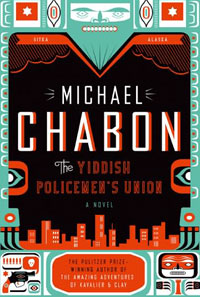 BY MAVIS LINNEMANN BOOK CRITIC Michael Chabon throws down metaphors like a deejay dropping beats, skillfully teasing out the intersections of character and the circumstance that bend, break and, eventually, make them. As author of Pulitzer Prize-winning The Amazing Adventures of Cavalier & Clay and the critically acclaimed book-turned-movie Wonder Boys, Chabon has proven himself time and time again as a master storyteller. His new novel, The Yiddish Policeman’s Union, is no exception.
BY MAVIS LINNEMANN BOOK CRITIC Michael Chabon throws down metaphors like a deejay dropping beats, skillfully teasing out the intersections of character and the circumstance that bend, break and, eventually, make them. As author of Pulitzer Prize-winning The Amazing Adventures of Cavalier & Clay and the critically acclaimed book-turned-movie Wonder Boys, Chabon has proven himself time and time again as a master storyteller. His new novel, The Yiddish Policeman’s Union, is no exception.
Lovers of film noir will appreciate Chabon’s protagonist, Detective Meyer Landsman, for his Bogart-like qualities. Like Bogey in The Big Sleep, Landsman is at once a ruthless, short-tempered gumshoe and a world-wearied, blase man. In Chabon’s post-WWII fictional universe, Jews are offered a temporary homeland in Alaska. Sixty years later, the United States has decided not to renew its contract with the Alaskan Jews, and they will soon be forced to vacate the state. During this “Reversion,” the Yiddish Policeman’s Union will also be dissolved, along with Landsman’s job — not that he cares all that much. However, when an unidentifiable chess player and junkie is murdered in the hotel Landsman calls home, the detective and his half-Jew, half-Tlingit partner, Berko, embark on a journey to not only discover the man’s true identity and killer, but also how his homicide relates to the upcoming Reversion and the seedy underworld of the Jewish mafia in Sitka, Alaska.
— not that he cares all that much. However, when an unidentifiable chess player and junkie is murdered in the hotel Landsman calls home, the detective and his half-Jew, half-Tlingit partner, Berko, embark on a journey to not only discover the man’s true identity and killer, but also how his homicide relates to the upcoming Reversion and the seedy underworld of the Jewish mafia in Sitka, Alaska.
No noir is complete without a strong female character and Chabon’s got Landsman’s red-headed ex-wife, now commanding officer, Bina. She may not be a femme fatale, but she’s a demanding, confident woman in charge of organizing the Sitka police department and closing as many homicide cases as possible — including Landsman’s. Sometimes, though, his detailed plots become knotted, so much so that even he seems to have trouble untangling them. Yiddish sprinkles the text, but its not always explained thoroughly enough for us goyim. At points, both the plot and the story go way over the top, but isn’t that what noir is for? Chabon is still an expert on genre-mashing, with elements of noir, pulp, alternative-history, romance and good ol’ fashioned fiction all claiming a place in The Yiddish Policeman’s Union. With Chabon, this categorical blending never seems too forced or awkward, allowing the reader to guzzle the concoction in one giant gulp.
